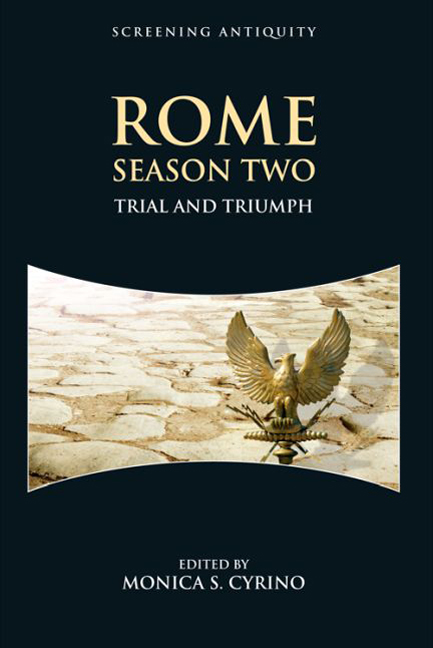Book contents
- Frontmatter
- Contents
- Series Editors’ Preface
- Editor's Acknowledgments
- Contributors
- List of Illustrations
- Episode Listing
- Cast List
- Introduction: The Trials and Triumphs of Rome, Season Two
- PART I POWER AND POLITICS
- 1 A Touch Too Cerebral: Eulogizing Caesar in Rome
- 2 Discharging Pullo and Vorenus: Veterans in Rome
- 3 Gangsterism in Rome
- 4 Class, Chaos, and Control in Rome
- 5 Earning Immortality: Cicero's Death Scene in Rome
- 6 The Triumvirate of the Ring in Rome
- 7 Jews and Judaism in Rome
- PART II Sex and Status
- Filmography
- Bibliography
- Index
7 - Jews and Judaism in Rome
from PART I - POWER AND POLITICS
Published online by Cambridge University Press: 07 October 2017
- Frontmatter
- Contents
- Series Editors’ Preface
- Editor's Acknowledgments
- Contributors
- List of Illustrations
- Episode Listing
- Cast List
- Introduction: The Trials and Triumphs of Rome, Season Two
- PART I POWER AND POLITICS
- 1 A Touch Too Cerebral: Eulogizing Caesar in Rome
- 2 Discharging Pullo and Vorenus: Veterans in Rome
- 3 Gangsterism in Rome
- 4 Class, Chaos, and Control in Rome
- 5 Earning Immortality: Cicero's Death Scene in Rome
- 6 The Triumvirate of the Ring in Rome
- 7 Jews and Judaism in Rome
- PART II Sex and Status
- Filmography
- Bibliography
- Index
Summary
A subplot was introduced in the second season of Rome, involving Timon the Jew and his brother, Levi, who is freshly arrived from Jerusalem. This thread was intended to set up the situation for the anticipated fifth season, which was to deal with the rise of Messianism in Judea. With the cancellation of seasons three through five, this subplot could not be developed further, but even as it stands the thread highlights some interesting points that reveal more about ideas and concerns about the role of Jews, Judaism, and Israel in the modern world than anything about ancient Rome.
TIMON THE JEW IN ROME, SEASON ONE
The figure of Timon first appears in Rome in the first season, where he is employed by Atia of the Julii as a hired thug and assassin. In this capacity, he provides a variety of services, ranging from protection to murder. He is also one of Atia's lovers, bargaining for sexual favors in return for providing the services she requires. In these early episodes the audience learn that he has a family, but this family does not appear on screen, nor are we told any personal details about them or about Timon himself. He is described briefly once in episode 5 (“The Ram has Touched the Wall”) as “Timon the Horse Jew,” but it is still something of a surprise when in episode 9 (“Utica”), the following short dialogue occurs, while Timon is watching for Servilia.
Friend: What's the hat for?
Timon: Yom Kippur.
Friend: Oh, is that today?
Timon: You call yourself a Jew?
Friend: What're you, my Rebbe now?
Suddenly there is a new dimension to Timon; although little indication of his ethnic identity has been given until now, it appears that he is a Jew. It is notable that this revelation occurs at the very moment that Timon first shows any discomfort with his lifestyle and job as Atia's henchman; as Servilia is dragged from her litter and attacked, Timon looks on with a troubled expression on his face, clearly uncomfortable with the proceedings. This discomfort is to be linked in the viewer's mind with the knowledge that he is a Jew, and perhaps with the fact that it is Yom Kippur, the holiest day of the Jewish calendar, whose nature is at sharp odds with the actions taking place before his eyes.
- Type
- Chapter
- Information
- Rome Season TwoTrial and Triumph, pp. 88 - 102Publisher: Edinburgh University PressPrint publication year: 2015

